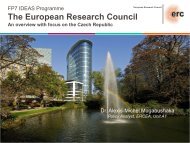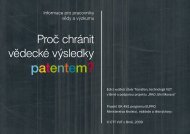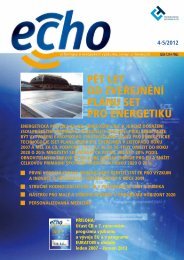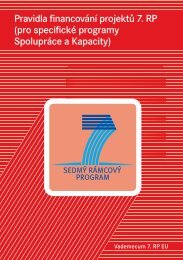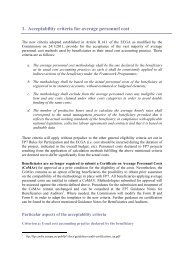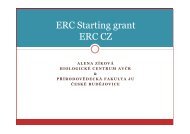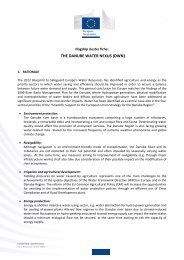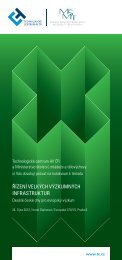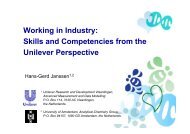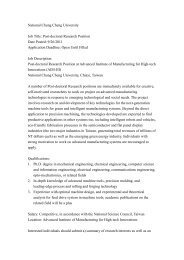Guide to Research and Innovation Strategies for Smart Specialisation
Guide to Research and Innovation Strategies for Smart Specialisation
Guide to Research and Innovation Strategies for Smart Specialisation
You also want an ePaper? Increase the reach of your titles
YUMPU automatically turns print PDFs into web optimized ePapers that Google loves.
Clusters <strong>and</strong> <strong>Smart</strong> <strong>Specialisation</strong><br />
Why should clusters be part of smart specialisation?<br />
Due <strong>to</strong> their inherent capability <strong>to</strong> support cooperation between different innovation ac<strong>to</strong>rs in<br />
a region, clusters are powerful instruments <strong>to</strong> foster industrial competitiveness, innovation <strong>and</strong><br />
regional growth. Currently, they are used by policy makers worldwide as building blocks <strong>for</strong><br />
implementing different policies such research & innovation, industrial <strong>and</strong> regional policies.<br />
<strong>Smart</strong> specialisation requires that regional governments have a clear vision <strong>and</strong> be committed,<br />
<strong>and</strong> at the same time, have people who will take up <strong>and</strong> realise such strategies on the ground.<br />
Clusters offer a huge potential <strong>to</strong> implement smart specialisation strategies by providing <strong>and</strong><br />
mobilising the necessary resources <strong>for</strong> that purpose. Their knowledge, networks, <strong>and</strong><br />
dynamism are the right ingredients that are available at local level allowing regions creating<br />
more value, reaching higher levels of excellence <strong>and</strong> thriving in the global economy.<br />
Clusters can be used at both the design <strong>and</strong> the implementation phase of smart specialisation<br />
strategies. In the design phase, they can be used <strong>to</strong> identify the industrial strengths <strong>and</strong> assets<br />
in a region, contribute <strong>to</strong> set strategic priorities <strong>and</strong> take the right political decisions. For this<br />
purpose, cluster mapping <strong>and</strong> benchmarking are valuable <strong>to</strong>ols that can be used <strong>to</strong> identify<br />
regional specialisation patterns <strong>and</strong> compare economic activities, including agriculture,<br />
strengths with other regions in the EU.<br />
In the implementation phase, clusters can be used as efficient plat<strong>for</strong>ms that can focus on <strong>and</strong><br />
quickly contribute <strong>to</strong> smart specialisation’s objectives. In particular, by fostering crosssec<strong>to</strong>ral<br />
cooperation, clusters can contribute <strong>to</strong> implement thematic-based strategies<br />
addressing new society challenges, <strong>and</strong> creating new competitive advantages in a region.<br />
Barriers <strong>and</strong> challenges<br />
The use of clusters <strong>for</strong> smart specialisation may imply important political decisions regarding<br />
the development of new cluster initiatives or the use of existing ones. New cluster initiatives<br />
can be launched provided that they are crucial <strong>for</strong> implementing the regional governments’<br />
visions <strong>and</strong> there<strong>for</strong>e being strongly supported in the future. Otherwise, new cluster initiatives<br />
should be avoided. Fragmentation <strong>and</strong> proliferation of cluster initiatives often leads <strong>to</strong><br />
dispersion of <strong>for</strong>ces <strong>and</strong> financial resources as well as <strong>to</strong> less cooperation <strong>and</strong> synergies<br />
between them.<br />
Policy makers can streamline existing cluster initiatives <strong>to</strong>wards the goals <strong>and</strong> objectives of<br />
smart specialisation. In parallel, linkages between different initiatives should be strengthened<br />
<strong>to</strong> enable clusters becoming less vulnerable <strong>to</strong> future market changes <strong>and</strong> be better prepared <strong>to</strong><br />
shape new markets. The support of such cross-linkages often requires a new mindset <strong>and</strong><br />
courageous political decisions which may be a not easy task in some regions.<br />
Identification of regional strengths is not a trivial task <strong>and</strong> requires reliable his<strong>to</strong>rical<br />
statistical data <strong>and</strong> in-depth analysis. Cluster mapping <strong>and</strong> benchmarking activities are<br />
powerful <strong>to</strong>ols <strong>for</strong> starting assessing regional specialisation patterns <strong>and</strong> comparing statistical<br />
67



